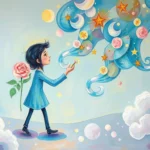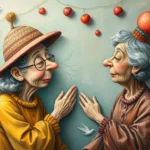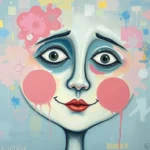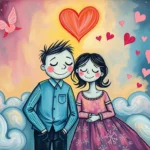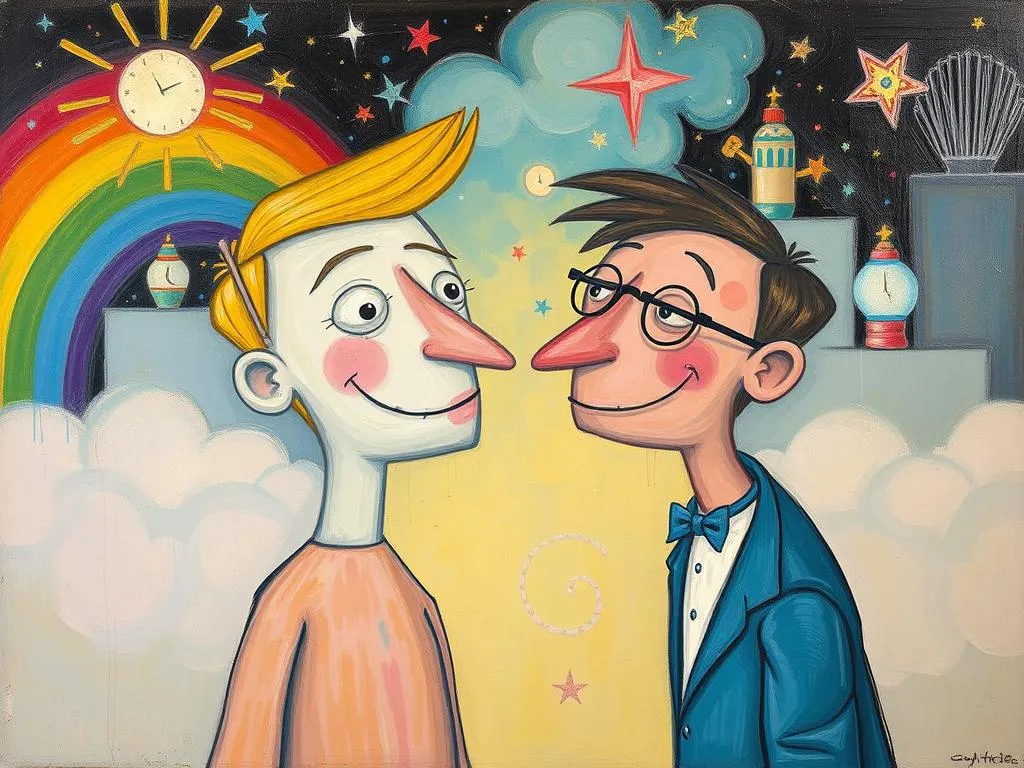
Introduction
Dreams have long fascinated humanity, serving as windows into our subconscious mind and revealing hidden desires, fears, and emotions. Among the myriad of themes that dreams can explore, the dynamics of sexual orientation—including experiences related to being gay or straight—hold particular intrigue. Such dreams often evoke a mix of curiosity and confusion, prompting individuals to seek understanding. Whether you identify as part of the LGBTQ+ community or adhere to a more traditional heterosexual identity, dreams involving these themes can provide valuable insights into your self-identity, relationships, and societal perceptions. In this article, we will delve into the symbolism and meanings behind dreams featuring gay and straight themes, explore various scenarios that might emerge, and offer real-life connections to help you reflect on these dreams.
Symbolism and Meaning
At the heart of dreams featuring gay and straight themes lies a rich tapestry of symbols that can vary significantly based on personal experiences and societal influences. Understanding these symbols can be the first step towards unraveling the meanings behind such dreams.
The most prominent symbol in these dreams is the sexual orientation itself. For many, the presence of a same-sex partner in a dream may symbolize a desire for deeper connections or a longing for acceptance. It can also indicate a process of self-discovery, where the dreamer might be exploring or questioning their own identity. In contrast, dreaming of a heterosexual romance might signify societal norms, comfort, or adherence to traditional values.
Another key element is the setting of the dream. A dream set in a public place, such as a bar or a party, can highlight themes of acceptance and fear of judgment. If the dreamer feels comfortable and free in this environment, it can symbolize a healthy acceptance of one’s identity. Conversely, if the setting is fraught with tension or discomfort, it may indicate internal conflicts regarding one’s sexual orientation or societal pressures.
Interactions within the dream also play a critical role in interpretation. A positive interaction with a same-sex partner might suggest a need for emotional support and connection, while a negative or hostile interaction could reflect internalized homophobia or fear of societal rejection. Similarly, interactions with heterosexual partners can reveal feelings of safety or compliance with societal expectations.
Lastly, consider the emotions experienced during the dream. Feelings of joy, excitement, or contentment can indicate a desire for acceptance and love, while anxiety, shame, or confusion may suggest unresolved conflicts or fears regarding one’s identity.
In summary, the symbolism of dreams involving gay and straight themes is deeply personal and multifaceted. These dreams often serve as mirrors reflecting our innermost feelings, desires, and fears, illuminating the complexities of our identities and relationships.
Key Scenarios and Variations
Dreams are not monolithic; they are shaped by individual experiences and emotions. The scenarios that unfold in dreams featuring gay and straight themes can vary greatly, and each variation carries its own nuanced interpretation.
One common scenario involves unexpected attractions, where a person finds themselves romantically interested in someone of the same sex, regardless of their waking sexual orientation. This dream might challenge the dreamer’s understanding of their own desires and can indicate a burgeoning curiosity about different aspects of their identity. It may suggest that the dreamer is open to exploring new dimensions of their personality or relationships.
Another scenario might involve conflict—for instance, dreaming of being in a same-sex relationship but feeling shame or fear in the dream. This can signify internal struggles with one’s identity, perhaps stemming from societal pressures or personal beliefs. The dreamer may be grappling with the acceptance of their true self, leading to feelings of fear or guilt.
Additionally, dreams can feature exposure—where the dreamer is outed or publicly displays their sexual orientation. Such dreams often reflect anxieties about societal acceptance and the fear of judgment from others. They can also symbolize a desire to live authentically, even when faced with potential backlash.
On the other hand, dreaming of acceptance—such as being in a loving same-sex relationship that is celebrated by friends and family—can signify a longing for connection and belonging. It can reflect a dreamer’s desire for a supportive community that embraces diversity.
Lastly, there are scenarios involving reconciliation with past relationships, where the dreamer revisits a former partner of the same or different sex. This type of dream might indicate unresolved feelings or a need for closure. It can also suggest that the dreamer is processing their past experiences and how these have shaped their current identity.
These variations illustrate how dreams can serve as a canvas for exploring intricate feelings around sexual orientation, identity, and societal expectations. Each scenario invites the dreamer to reflect on their personal experiences and emotional truths.
Real-Life Connections and Takeaways
Connecting dreams about gay and straight themes to real-life situations can provide deeper insights into our waking lives. These dreams often serve as a prompt for self-reflection and exploration of one’s identity and relationships.
If you find yourself dreaming about same-sex relationships, consider how these dreams may reflect your current feelings about your identity. Are there aspects of yourself that you have yet to explore? Are you feeling confined by societal expectations? Use these dreams as an opportunity to engage in honest self-reflection. Journaling your thoughts and feelings can be a powerful way to articulate your experiences and gain clarity.
Additionally, think about your relationships with those around you. Dreams about acceptance or conflict can mirror your real-life interactions. Are there people in your life who support your identity? Are there relationships that feel strained due to differing beliefs? Reflecting on these connections can help you navigate your social landscape with greater awareness.
If you experience dreams of exposure or judgment, it might be time to evaluate how much of your true self you are sharing with the world. Are there fears holding you back from living authentically? Engaging in conversations with trusted friends or a therapist could provide a safe space to explore these feelings further.
Moreover, consider the emotional landscape of your dreams. If you frequently feel joy and contentment in your dreams, it might be a sign that you are on a path toward self-acceptance. Conversely, if you feel anxiety or fear, it could indicate unresolved issues that need addressing. Take note of these emotions and allow them to guide your self-discovery journey.
Ultimately, the dream world is not merely a reflection of our subconscious but a powerful tool for self-exploration. By examining the symbols, scenarios, and emotions present in your dreams, you can gain valuable insights that may help you navigate your waking life with greater authenticity and understanding.
In conclusion, dreams involving gay and straight themes can be rich with meaning, offering a unique glimpse into our inner worlds. They challenge us to confront our beliefs, desires, and fears, providing a pathway toward greater self-acceptance and love. Embrace the journey of understanding your dreams, and allow them to illuminate the hidden corners of your identity.
